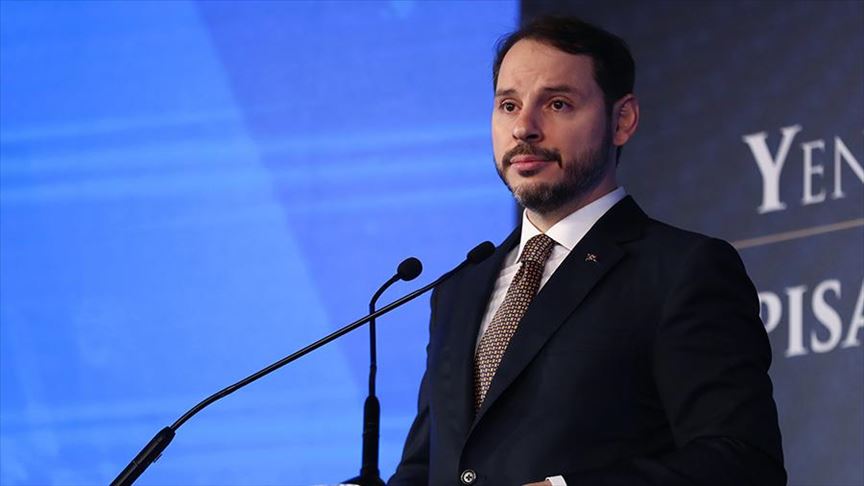Turkey to focus on structural reform: Treasury minister
Berat Albayrak says transformation and reform process will decisively continue in 4.5-year period with no election

ANKARA
Turkey will focus on structural reforms to achieve the target of a greater and more powerful economy, the treasury and finance minister said Wednesday.
"This transformation and reform process will decisively continue in a four-and-a-half-year period without elections," said Berat Albayrak.
Speaking at a news conference to announce the government's action plan, Albayrak said the financial sector prioritized a new set of structural reforms for 2019.
"Strengthening state-run lenders' capital structure will be our first step," he said, adding that the Treasury will issue 28 billion Turkish lira worth (around $5 billion) of government debt securities to make state banks' balance sheets robust.
Albayrak said efforts in coordination with the banking watchdog and banking association are continuing to support private lenders' capital structure.
A new individual pension system according to citizens' income level will be determined in the days to come, he said.
"We prioritize creating an effective and healthy saving system, starting from the state to individuals, to eliminate fragilities in the economy.
"In the next five years, funds accumulated in the new retirement system will exceed 10% of the country's gross domestic product," Albayrak said.
He added that Turkey will also take steps in the real sector to ensure the healthy working of the financial sector.
Banks and agriculture
As of February a total of 50 state/private/foreign lenders -- including deposit banks, participation banks, and development and investment banks -- are active in Turkey.
Measuring the health of loans, the ratio of non-performing loans to total cash loans -- the lower the better -- was 4.11% in February, versus 2.92% in the same month last year.
Touching on consumer prices, Albayrak said the National Unity in Agriculture project will be most important reform to combat food inflation.
"In May, this comprehensive strategy will be unveiled by the Agriculture and Forestry Ministry," he said.
As of March, Turkey's annual inflation rate was 19.71%, up slightly from 19.67% in February.
Over the last decade, annual inflation saw its lowest level at 3.99% in March 2011, while it peaked at 25.24% in October 2018.
Under Turkey's new economic program announced last September, the country's inflation rate target is 15.9% this year, 9.8% next year, and 6.0% in 2021.
Albayrak also said a greenhouse corporation will be established to work as a balance element in the fresh fruits and vegetables sector.
"At a first stage, a technological greenhouse will be built on some 2,000 hectares by this corporation in 2019," he said, aiming to meet 25% of the country's total greenhouse production in the long-run.
Meanwhile, red meat price stability will be supported by “a sheep and goat farming move,” Albayrak said.
"Turkey's stock of sheep and goats will reach 100 million within four years thanks to government incentives.”
According to official figures, the number of ovine animals surged 4.1% to 46.1 million heads last year.
Taxes
The treasury minister also said a new tax system will be introduced this year.
"Turkey will gradually reduce tax exemptions and cut corporate income taxes in the new system,"
He pledged to cut indirect taxes to boost the share of direct taxes and ensure a fairer system.
Touting Turkey's geographical location, Albayrak said the Turkiye Wealth Fund and relevant institutions are working on a logistics master plan to make the country a regional hub for international trade.
The fund, established in 2016, holds all or part of the shares of several Turkish companies such as flag carrier Turkish Airlines, telecommunications giant Turk Telekom, state lenders Ziraat Bankasi and Halkbank, oil company Turkish Petroleum, and stock market Borsa Istanbul.
Albayrak said the government will announce a master plan in September at the latest to boost the country's tourism revenues and attract more visitors.
With this plan, Turkey will hit $70 billions in income while welcoming 70 million tourists over the next four years, he added.
The country's tourism revenues in 2018 totaled $29.5 billion, up 12.3% year-on-year, according to official figures.
Turkey welcomed 45.6 million visitors last year -- 85.4% foreign and 14.6% representing Turkish citizens living abroad.
Anadolu Agency website contains only a portion of the news stories offered to subscribers in the AA News Broadcasting System (HAS), and in summarized form. Please contact us for subscription options.

